MercoPress. South Atlantic News Agency
Tag: Argentina IMF
-
Monday, September 17th 2018 - 08:12 UTC
International support for Argentina's general strike against IMF austerity measures
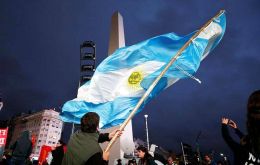
The International Trade Union Conference, ITUC’s affiliates in Argentina, CGT, CTA-A and CTA-T have announced a general strike for 24-25 September in opposition to expected sweeping austerity measures being developed by the government and the International Monetary Fund.
-
Saturday, September 8th 2018 - 09:11 UTC
Argentine Peso and markets end the week positively; “sufficient financing in 2019” says central bank
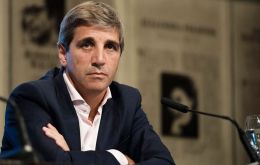
Argentina’s central bank governor, Luis Caputo, said on Friday that government financing for 2019 was more than sufficient and that high yields on the country’s sovereign debt were “exaggerated,” prompting the peso currency to reverse earlier
-
Friday, September 7th 2018 - 09:18 UTC
IMF wants to wrap up talks to financially support Argentina “as rapidly as possible”
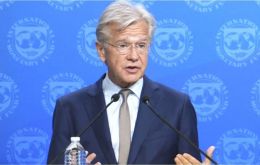
The International Monetary Fund said on Thursday it aimed to wrap up talks to “strengthen” a US$ 50 billion backup financing deal with Argentina “as rapidly as possible,” as the country's peso and stocks climbed for a second straight day.
-
Wednesday, September 5th 2018 - 07:30 UTC
Argentina/IMF discussions continue this Wednesday; strong support from Trump

Argentina “made progress” on Tuesday in talks with the International Monetary Fund aimed at securing an accelerated disbursement of a US$50 billion loan it hopes will calm its debilitating economic crisis.
-
Saturday, September 1st 2018 - 07:46 UTC
IMF strong support helps stabilize Argentine Peso; Macri preparing new economic package
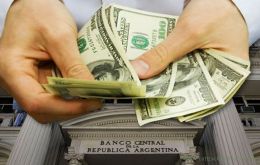
Argentina’s beleaguered peso stabilized on Friday as the central bank said it would auction a large amount of dollar reserves, and the International Monetary Fund (IMF) issued a strong statement of support for President Mauricio Macri’s government.
-
Thursday, August 30th 2018 - 09:11 UTC
Macri addresses the nation; IMF pledges more support but Peso falls 7%, a record 34 to the US dollar
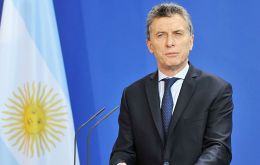
Argentina's Peso suffered its biggest one-day slide in almost three years on Wednesday after the central bank sold reserves for a second straight day and the president asked the International Monetary Fund for early release of standby funds.
-
Monday, July 23rd 2018 - 07:15 UTC
Top grades for Macri and his reform policies from IMF's Lagarde

Christine Lagarde, Managing Director of the International Monetary Fund, met with Argentina’s President Mauricio Macri, Finance Minister Nicolas Dujovne and Central Bank Governor Luis Caputo in the context of the Group of 20 Finance Ministers and Central Bank Governors meeting in Buenos Aires over the weekend.
-
Monday, July 23rd 2018 - 05:58 UTC
Hammond in Argentina iterates Falklands self determination and calls on Macri to address inflation and labor reform

The UK Government position is unchanged: only the Falkland Islanders have the right to determine their own political and economic future, stated Phillip Hammond in Buenos Aires where he attended a two-day G20 ministers meeting.
-
Friday, July 20th 2018 - 07:21 UTC
Argentina finances improving: half year primary deficit drops to 0.8% of GDP

Argentina posted a primary fiscal deficit of 105.8 billion pesos (US$3.7 billion), or 0.8% of gross domestic product (GDP) in the first half of 2018, government data showed on Thursday, down 26.7% from the same period last year.
-
Wednesday, July 18th 2018 - 07:38 UTC
Argentina consumer prices rose 3.7% in June and reach 29.5% in twelve months

Consumer prices rose 3.7% in June in Argentina, official data showed on Tuesday. That brought 12-month inflation to 29.5%, up from 26.3% in the 12 months through May, the INDEC national statistics bureau announced, which makes it the highest monthly recorded figure of the last two years.
